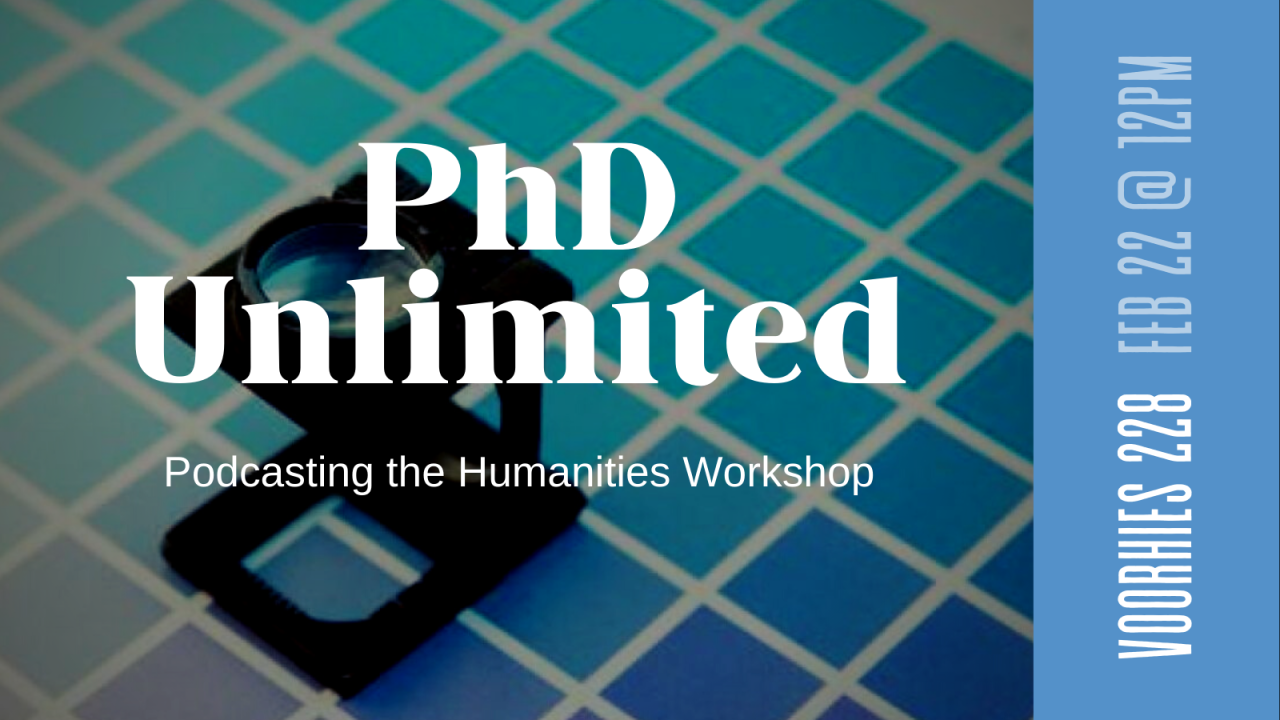
PhD Unlimited Hosts Podcasting Workshop
On February 22, PhD Unlimited held their second event of Winter Quarter, a hands-on podcasting workshop featuring Amy Quinton, News and Media Relations Specialist and co-host of the UC Davis podcast Unfold. The workshop began with an introduction by Stephanie Maroney, Mellon Public Scholars Program Manager and host of the event, in which she recapped PhD Unlimited’s earlier podcasting panel and summarized the insights from that event. After this introduction, Quinton shared the backstory of Unfold and gave participants advice on how to get started on a research-based podcast.
There are many genres of podcast, so the first step in creating a podcast is to identify which type of podcast best suits your goals and capacity. Quinton highlighted three major podcast genres: the interview podcast, in which the host interviews a different guest for each episode; the narrative storytelling podcast, in which the host edits together field recordings, interviews, and other sounds to immerse the listener in a subject; and a podcast that mixes these two forms to create a balance between interviews and other segments. Each of these genres has its strengths and weaknesses, meaning that you will have to decide which is most suitable for your content and goals. The genres also require different time commitments—while a narrative podcast requires a high degree of editing to create an immersive soundworld, many interview podcasts publish recorded interviews with little to no editing. When planning your own podcast, make sure to take these time requirements into consideration.
Many podcasts include some form of interviewing, from short soundbites to more extended conversations. According to Quinton, the pre-production process is the key to conducting successful interviews. If she’s planning to interview someone for Unfold, Quinton first holds a pre-interview conversation to get a general sense of the interviewee’s research or knowledge base and decide what specific avenues she might want to explore in the podcast, as well as to get a sense of that person’s conversation style. Holding this pre-interview conversation not only allows the recorded interview to be more focused, but it also helps the guest and host to feel at-ease during recording.
If you’re creating a narrative or hybrid podcast, you will probably need to script some or all of your content ahead of time. When writing a script, it is important that it sound like a natural conversation rather than like someone reading a paper. This means not only writing for the ear, but taking the time to rehearse before recording. Unfold is entirely scripted, and Quinton said that the writing, editing, and rehearsal process takes up a significant percent of the production time for the podcast.
Like many radio programs, most podcasts that include interviews aim for an intimate sound, as if the listener was in the room with the discussants. The pre-interview process is crucial in achieving this sound because it allows the interviewee to feel comfortable and prepared, creating a more natural sounding conversation. But the technical side of the process is just as important. For instance, placing the microphone close to the person talking helps to create an intimate sound. Quinton often alternated between thinking through content generation and giving practical advice about recording and sound editing, highlighting the relationship between form and content.
Toward the end of the workshop, one of the workshop participants asked a question about promotion: once you’ve made your podcast, how do you share it so that people can find it? Given the sheer volume of podcasts currently being produced and the entry of large, well-funded players into the podcasting arena in recent years, it is unlikely that listeners will simply stumble on your podcast like they might have been able to do when podcasting was still in its infancy. Social media and other forms of promotion are essential for helping listeners find your podcast. Another great way to reach new listeners is to team up with a similar podcast for cross-promotion, with the hosts of each podcast appearing as guests on each other’s shows. This not only exposes each podcast to a new audience, but also creates new opportunities for collaboration and creativity.
While stressing the importance of promotion for finding listeners, Quinton reminded participants that podcasting does not need to be a mass media in order to be successful. In fact, a majority of podcasts average less than 150 downloads per episode. Instead of focusing on sheer numbers, podcasting allows you to hone in on a niche audience who is interested in your research. By appealing to a specific audience, you have the unique opportunity to find and foster a community of listeners.
At the end of the workshop, Maroney led the participants to the DHI’s new podcasting lab, a space created to host student and faculty podcasters as they record and edit their podcasts. The lab includes microphones and other recording equipment as well as a computer workstation that can be used for sound editing. The DHI hopes to make this resource available beginning in Spring quarter of this year. If you’re interested in using this space, keep an eye on our website and newsletter for further announcements.
Have you ever thought about starting a podcast, or are you curious about their potential for public scholarship? Check out our new series, “Podcast University: Sounding Stories from Across the Humanities,” which highlights podcasting projects by UC Davis graduate students, faculty, and staff. You can read previous articles in the series here, here, and here.
